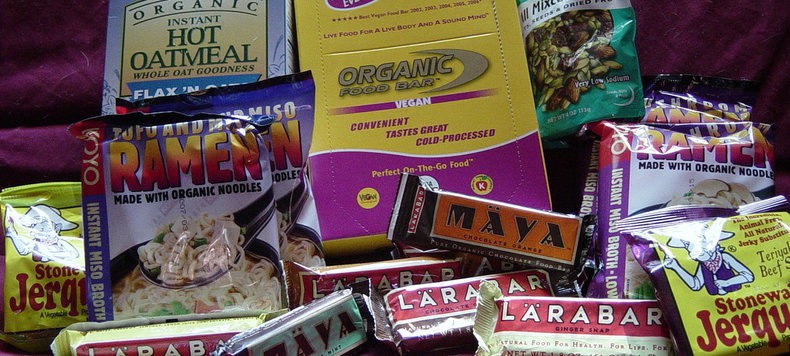In most interpreter training programs (ITP) we’re taught that an interpreter should be ready for anything at the last moment. A lot of this discussion seems to focus on having both dress and casual clothes and shoes in your trunk. While we should look appropriate for the work we do, I tend to focus more on interpreter safety and health. Here’s what I find helpful to keep in my kit as a freelancer:
Food-Water
High quality snacks that complement my normal diet are necessary for me to maintain physical and mental stamina. I’m gluten sensitive and a vegetarian, so I have to have snacks that match those requirements. Make sure you have food that you feel comfortable eating so you don’t do without. It’s tempting to skimp on snacks, but it will only hurt your work.
Durable, safe food items and packaging is important if you don’t want to make yourself sick or go hungry because your baggie of grapes ripped or your turkey sandwich got left near the heat register. I like to look at hiking and camping food for inspiration. They have a long shelf life and the packaging is durable.
Personally, I think of my neurological functions in terms of a wet cell car battery. Without enough water, those synapses won’t fire. Drinking enough water is a challenge, but I notice a huge difference in my work when I’m not getting enough hydration. Even if my water intake requires that I occasionally have to ask the consumers for a quick break, it’s worth it.
Bodily Comfort
Essentially, clothing is meant to protect our bodies from the elements. As humans and individuals, it’s more complicated. For interpreters it’s more so. We have to combine comfort and propriety in this field. While blending in with our consumers, we have to be able to interpret not only that job, but the one after that and the one after that.
Confession: I love stilettos. When I started this career, I wore heels every day. I was also exhausted every day and in pain when I went home from work. These days, I wear shoes that you would see a nurse wearing. After seeing a physical therapist for 2+ months to correct back, shoulder and neck issues, I gravitate to shoes and boots that SUPPORT the body that provides my living. I save the stilettos for special occasions.
Medications, prescriptions or anything that you use throughout a normal day should be part of your interpreting day. Small pill boxes can be purchased at the dollar store and are inconspicuous in your pocket or bag.
If you tend to get cold while you’re working, you know it’s miserable. See my video on how to stay warm here. You’ll probably laugh, but I bet you’ll follow my lead.
Safety
This is where you do need to build a kit in your car’s trunk. It should contain:
- Auto emergency kit
- Bad weather clothes (mine includes snow boots, coveralls, heavy coat)
- Food and water (being stuck on the side of the road is bad enough without being hungry and thirsty.
- PHONE CHARGER!!! You can’t even call 911 if your phone is dead.
- First Aid kit
GPS way finding is one of my favorite modern conveniences, but it’s also becoming a safety tool for interpreters. Applications for smart phones allow you to share your location with select individuals, and the tracking can be turned on and off. Interpreters have told me that they feel better knowing that significant others can check in to see where they are on long trips or when they’re running late. They also like that they don’t have to make out an itinerary every day.
AAA or another automotive emergency service gives you peace of mind when your car starts shuddering and you’re nowhere near home. It’s an investment you may never see a return on, but very worth the cost.
Technology
In my opinion, a smart phone with a robust data plan is indispensable for a sign language interpreter. This is how you’ll be offered and accept assignments, changes to those assignments, etc. Once on the job, this is where you’ll be able to quickly Google new terms or concepts.
A GPS device (not your phone) is a must, in my opinion. While the turn by turn directions have improved for phones, they’re still battery and data hogs. Invest in the GPS device and save your phone for communicating with customers and consumers. If your battery or data runs low, how can you get in touch with the agency?
A weather alert application for your smart phone will alert you to dangerous conditions either at your current appointment or later that day. Mine has allowed me to avoid a job that would have placed me in the path of a tornado once. Many of us cover such large areas that a warning or watch in the area we’re headed to isn’t announced in the area we’re in.
Final Thoughts
All of us have our own additions to make to the basic kit, but these are the items that I consider essential. We can’t do the job if we’re not safe or comfortable. We’ve put so much into this field, it seems silly to not make sure we can remain here.
Photo by Moria

